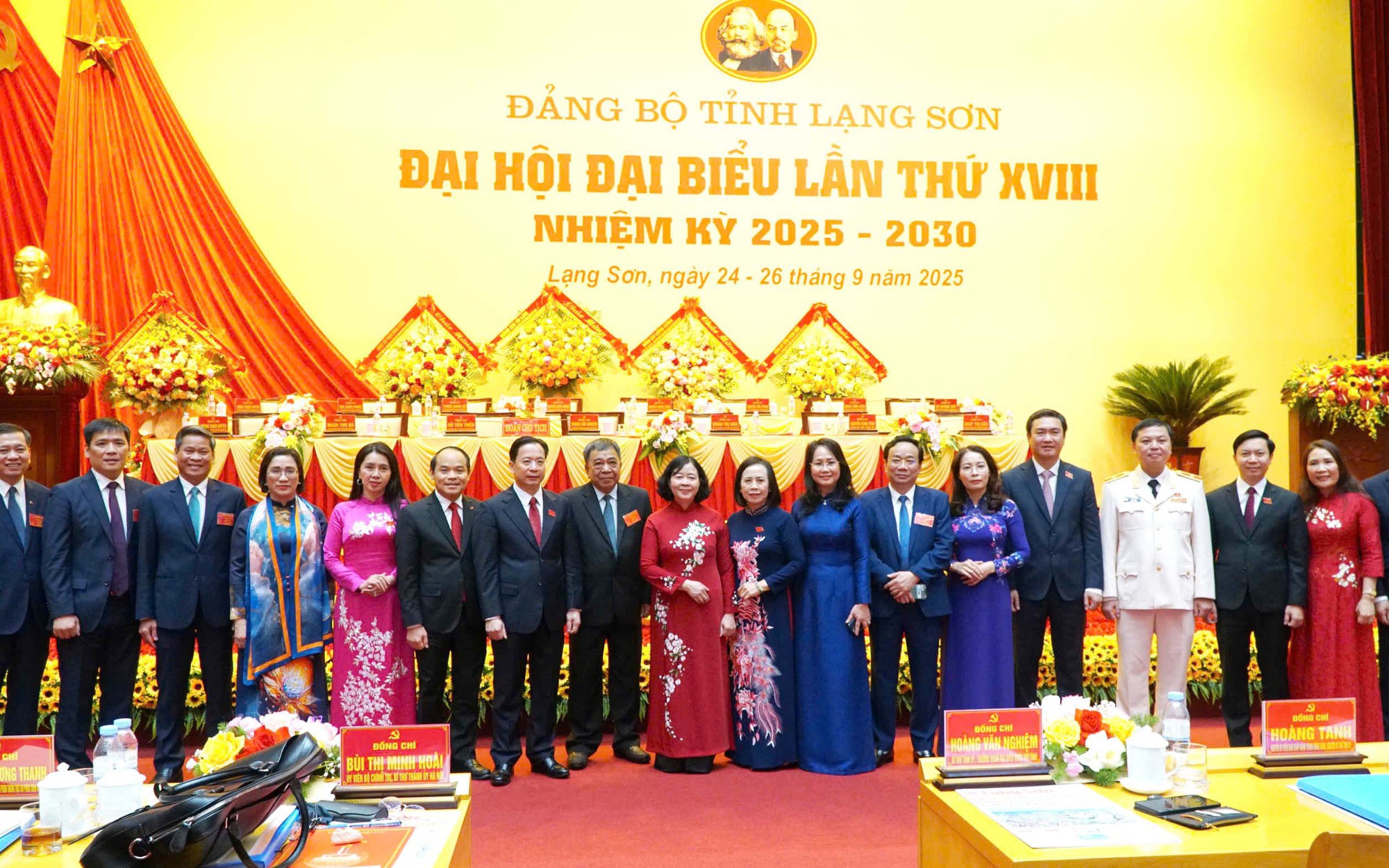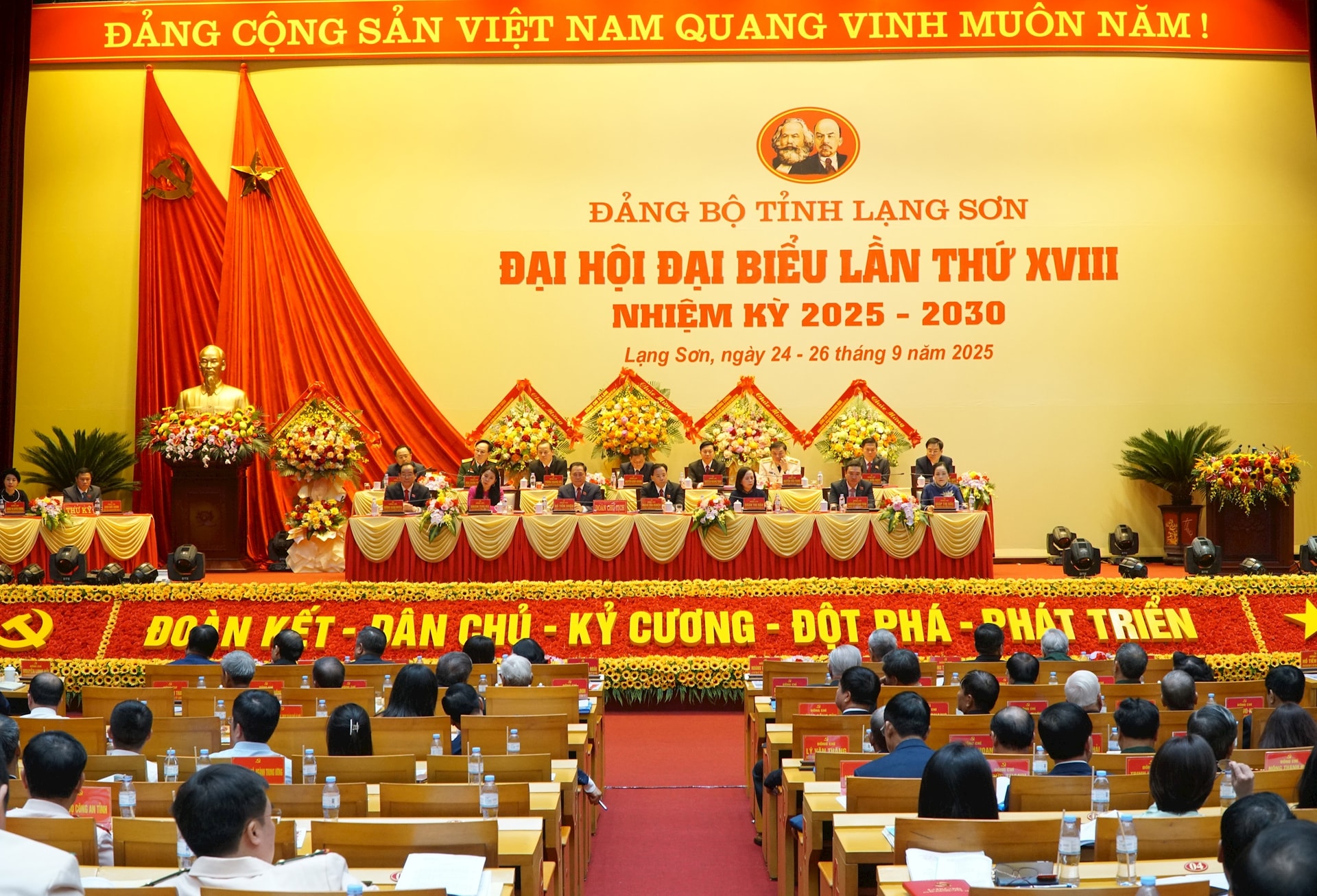On assignment from the Politburo, Politburo member, Secretary of the Hanoi Party Committee, and Head of Hanoi's National Assembly delegation Bui Thi Minh Hoai attended and delivered guiding remarks.

Delegates at the event.
The 18th Congress of the Lang Son Provincial Party Committee is taking place from September 24 to 26, 2025.
Its theme is "Building a clean and strong Party and political system; promoting the strength of unity; mobilizing all resources to realize the aspiration for development; and building Lang Son into a growth pole of the Northern midlands and mountainous region."
The Congress will review implementation of the 17th Congress's resolution for 2020–2025, define the vision, goals, orientations, and main tasks for 2025–2030, contribute to the draft documents for the 14th National Party Congress, and elect the 18th Provincial Party Committee as well as the delegation to the 14th National Party Congress.
Over the past five years, with unity, determination and strong participation of the political system, citizens, and businesses, Lang Son has achieved important results. Of 20 key targets, 18 were met or exceeded.
The provincial economy maintained fast and sustainable growth, with GRDP for 2021–2025 estimated at 7.1 percent per year. Per capita GRDP rose from VND44.2 million (US$1,917) in 2020 to an expected VND71.1 million (US$2,900) in 2025.
However, two targets fell short, with agricultural, forestry, and tourism programs underperforming.
Border-gate economic potential has not been fully realized, infrastructure remains uneven, and digital infrastructure lags behind development needs.

Overview of the event.
For the next term, Lang Son aims to become one of the growth poles of the Northern midlands and mountainous region by 2030 and a relatively developed province by 2035.
The Congress documents set out 34 targets, 6 priority tasks, 3 breakthroughs, and 7 major solutions.
By 2030, the province targets GRDP of about VND111.1 trillion, average annual growth of 10–11 percent, per capita GRDP of VND130 million (US$5,000), the digital economy accounting for over 30 percent of GRDP, average life expectancy of 73.5–74 years, an HDI of 0.7–0.75, and over 90 percent of Party organizations and members rated as fulfilling their duties well.
Speaking on behalf of the Politburo, Bui Thi Minh Hoai warmly congratulated and praised the Party, government, armed forces, and people of Lang Son for their achievements.
She affirmed that the progress made in the last term, as well as in 40 years of renewal, had reshaped the province, strengthened public trust, and created a foundation for rapid and sustainable development, contributing to the nation's overall growth.
She acknowledged the frankness in assessing shortcomings and urged delegates to analyze causes, especially subjective ones, and draw lessons to guide corrective measures.
Agreeing with the Congress's political report and its theme of determination and aspiration, she emphasized five points: thoroughly implement Party and State policies, especially Politburo and Secretariat resolutions on healthcare, education, science and technology, private sector development, and institutional reform.
She also stressed strengthening local government under the two-tier model to serve citizens and businesses effectively; accelerating administrative reform linked to digital transformation; expanding decentralization with stronger oversight; removing institutional and policy bottlenecks; and creating a transparent, competitive investment environment.
She stressed the need to restructure agriculture tied to new rural development, manage and use resources efficiently, protect the environment, adapt to climate change, and promote modern industry alongside new growth drivers such as the digital, green, and circular economies.
She called for strong development of the border-gate economy to make Lang Son a logistics hub and a key import-export center, boosting trade, services, and tourism, thereby establishing Lang Son as a regional growth pole by 2030.
She also urged the province to preserve its cultural identity as a driver of sustainable growth, develop tourism products linked with the UNESCO Lang Son Global Geopark, and attract large-scale projects in eco-tourism, cultural tourism, and heritage experiences.
As a frontier province, Lang Son must closely link socio-economic growth with defense and security, build strong defensive zones, and expand effective foreign relations, thereby strengthening Vietnam–China friendship and building a peaceful, cooperative, and prosperous border.
On personnel, she asked delegates to carefully select candidates with integrity, competence, vision, and creativity who can lead the province to fulfill its goals. The new Provincial Party Committee must be a strong, united body closely connected to the people.
She concluded with confidence that with its revolutionary traditions and diverse cultural heritage, the Party, government, and people of Lang Son will remain united, self-reliant, and innovative, striving to make the province a developed border region and a growth pole of the Northern midlands and mountainous region, contributing to a prosperous, civilized, and happy Vietnam.
Also present were Central Committee members Nguyen Hoang Anh, Deputy Head of the Central Policy and Strategy Commission; Tran Sy Thanh, Deputy Secretary of the Hanoi Party Committee, Chairman of the Hanoi People's Committee, and former Secretary of the Lang Son Provincial Party Committee; Lam Thi Phuong Thanh, Standing Deputy Chief of the Party Central Office and former Provincial Secretary of Lang Son; and Nguyen Quoc Doan, Deputy Chief Justice of the Supreme People's Court and former Provincial Secretary of Lang Son.
Provincial leaders attending included Hoang Van Nghiem, Secretary of the Provincial Party Committee and Head of the provincial National Assembly delegation; Doan Thi Hau, Standing Deputy Secretary of the Provincial Party Committee and Chairwoman of the Provincial People's Council; Ho Tien Thieu, Deputy Secretary of the Provincial Party Committee and Chairman of the Provincial People's Committee; and Nguyen Canh Toan, Deputy Secretary of the Provincial Party Committee.